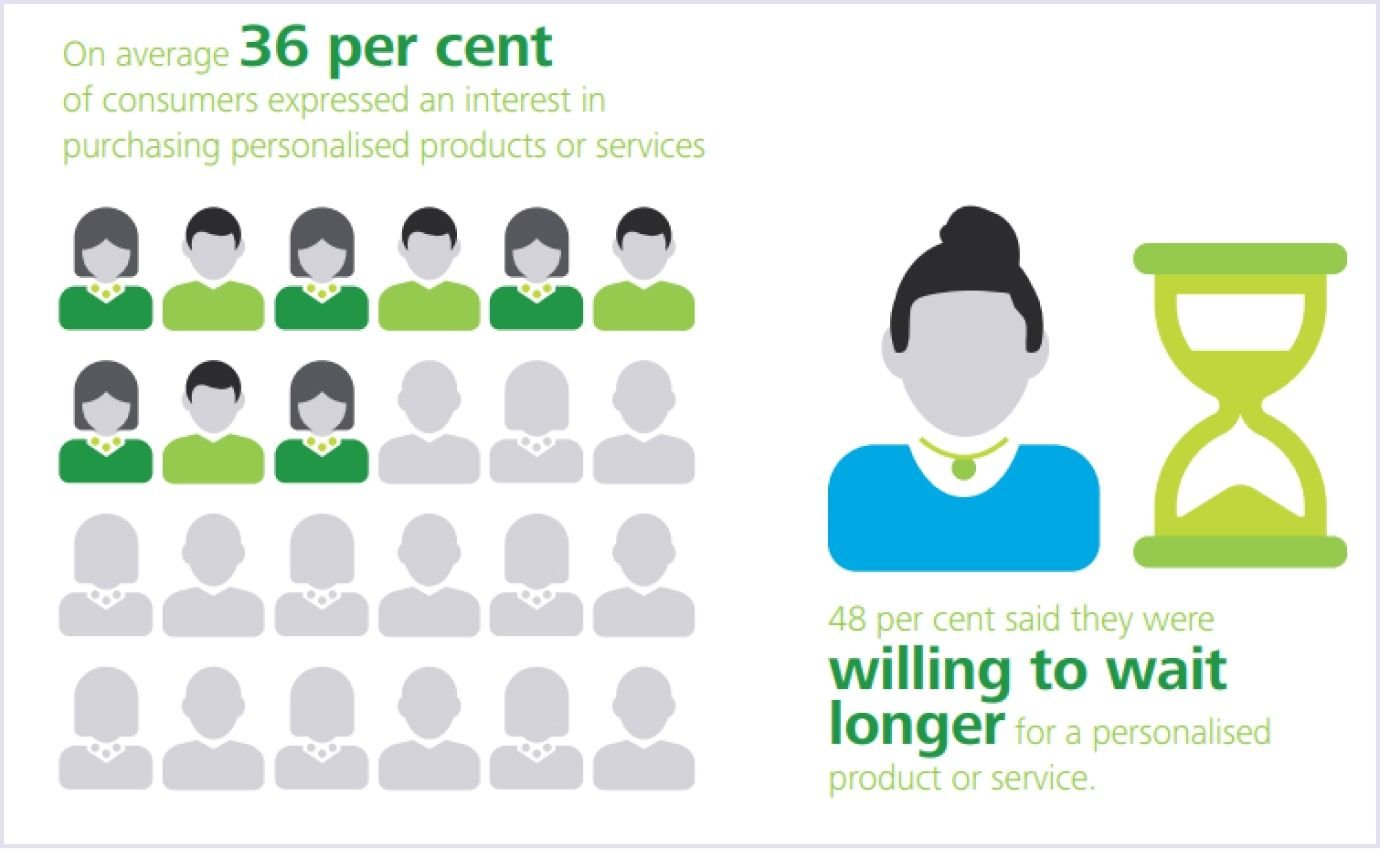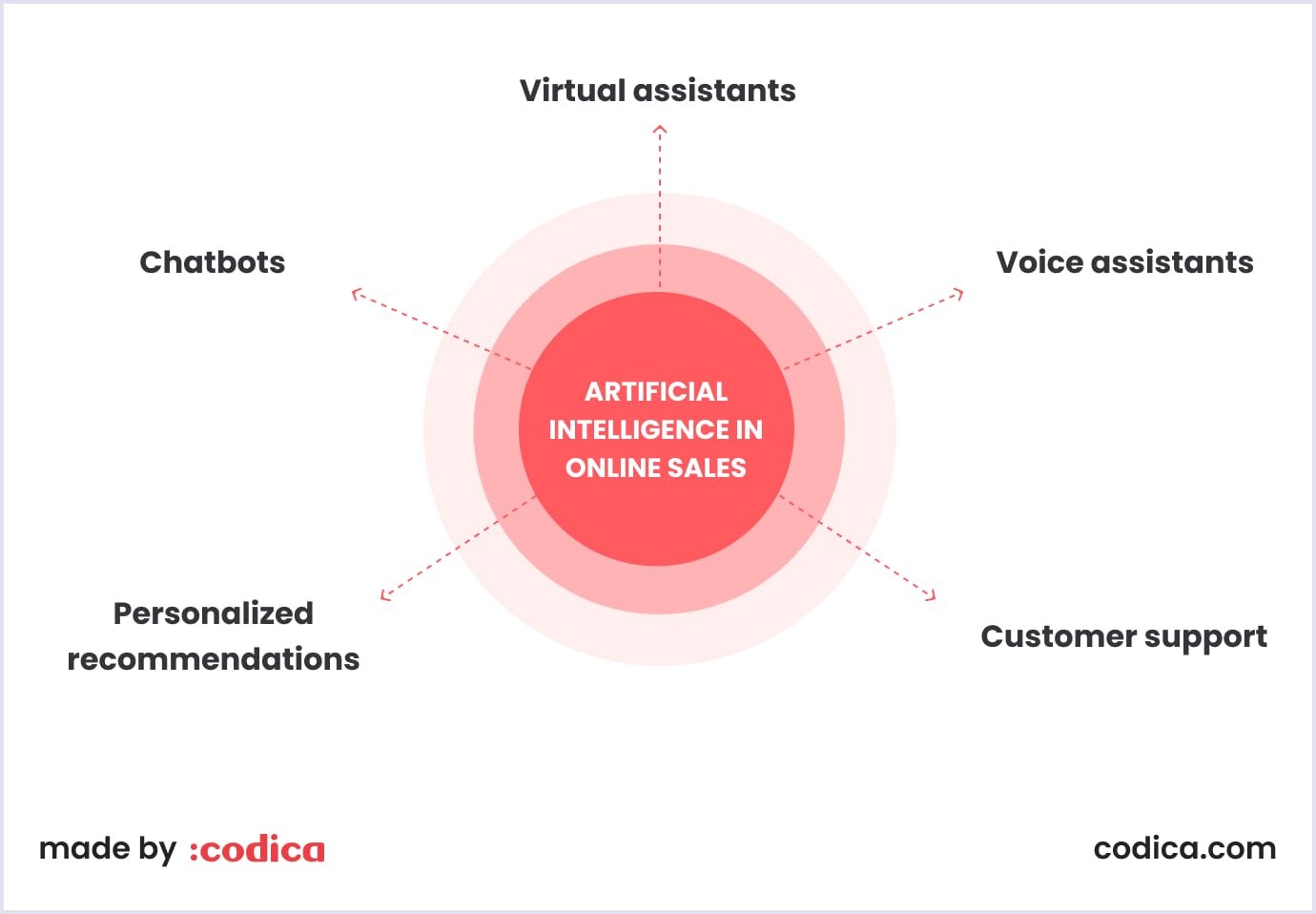Personalization in ecommerce means meeting customer demand with fitting suggestions. This can be product recommendations, voice assistance, offering complementary products, and more. The aim of personalized shopping is to help your customers find what they want and resolve issues quickly.
In this article, we give an overview of why you should turn to AI personalization and how you can use it in your online store. When building an online marketplace or an ecommerce platform, personalization is one of the key aspects. It forms the foundation of online business growth.
Let’s discover the AI personalization possibilities for online shopping.
What is personalized shopping?
Meeting unique customer demand has shaped online marketplaces. As the numbers show, 83% of customers are willing to share their data to get personalized experiences.
Personalized shopping means tailoring the shopping flow to help buyers find and choose what they need. Online marketplaces and ecommerce platforms leverage AI in online shopping, such as artificial intelligence and website feature design. So, shopping platforms provide unique features, messages, and interactions to ensure the best shopping experience.
Why is personalized shopping important for your sales? When done right, personalization and AI-powered shopping help make your customers feel understood. Hence, customers become more loyal to your brand and are likely to convert to repeat customers.
The role of AI in personalized shopping
Understanding AI personalization
As customers value personalization when shopping, including it in your online platform can boost your sales. In this regard, shopping AI helps you find the best points of customer satisfaction through data analysis. Browsing history and purchase records help AI understand shopper’s preferences. On the other hand, demographic details and real-time interactions give more details that AI shopping systems can use for personalization.
AI systems can understand and predict shoppers' wants and suggest suitable products, discounts, and promotions. In addition to traditional marketing methods, AI gives you a broader picture of what your customers need.
For example, Zappos, an online shoe and clothing platform, highlights recommended items, viewed items, and style recommendations.

Moreover, AI systems can predict what a shopper might need. They analyze previous searches and buying histories and discover shoppers' search intent. Based on this information, AI systems highlight products, discounts, and other suggestions. This AI ability is especially helpful when a customer is uncertain about their search or wants to see several options.

How AI personalizes the shopping experience
AI processes the shopping data of a particular customer and personalizes their experience through several touchpoints. The most common aspect of AI-powered shopping is product recommendations. When browsing the online store catalog, a shopper gives information to AI. The system analyzes the shopper’s search history and aligns suggestions with it. AI also makes suggestions based on user interactions with similar profiles or purchase histories.
Another way AI personalizes shopping experience is through dynamic content suggestions. AI understands user behavior and preferences. So, it highlights the relevant content for a shopper.
For example, a marketplace platform can show different content to buyers. This includes various landing pages, banners, and promotions based on preferred styles and past purchases. Moreover, AI helps you tailor your emails and send specific product recommendations to your customers.
You may also like: How Does AI Improve Online Marketplaces?
Types of AI technologies used for personalization
Several technologies in AI-powered shopping help personalize your online store’s content to engage your customers. Let’s look closer at these methods that you can use in online marketplace development.
Machine learning. AI personalization is based on this foundational technology. Machine learning algorithms analyze customer data. Thus, AI systems can grasp patterns and make predictions about appealing content. For instance, a popular machine-learning technique is collaborative filtering. It helps you get suggestions for users with similar preferences.
Below is a short video on Amazon Personalize. This service is based on machine learning and helps you highlight product suggestions and personalized choices to your customers. It is also easy for your developer team to add it to your online platform so you get positive business results.
Natural language processing (NLP). This tool enables AI online shopping systems to process and interpret human language. With NLP, you can analyze customer reviews, search queries, and chat interactions with virtual assistants. So, AI provides the relevant content and recommendations.
Predictive analytics. It is based on statistical methods. It predicts future purchase behavior and buying patterns. In terms of personalized shopping, the AI system lets you know what a particular shopper buys in spring or before the summer season. These insights will help you customize your marketing campaign and adjust the stock.
Recommendation engines. These AI systems help you offer products and content to your customers. By analyzing user profiles and product similarities, AI can form specific suggestions. For example, eBay uses a recommendation engine to highlight items similar to those you view. The recommendation on the catalog page shows what other customers have bought when searching for a similar item.

Benefits of AI-personalized shopping for marketplaces
Thanks to AI’s speed and ability to manage massive amounts of data, your online store provides better service and operations. You can implement AI and watch it do a valuable job in customer attraction and retention. Let’s see what you gain by implementing AI for personalized shopping in more detail.
Enhanced customer experience
AI in an ecommerce marketplace platform analyzes customers’ browsing history, viewed items, and purchases. Thus, shoppers get tailored recommendations and highlights on similar items. Instead of wandering around the catalog, customers can swiftly spot what they need. This tailored process makes AI online shopping enjoyable.
Moreover, ecommerce introduces chatbots and voice assistants. They can address common customer issues and offer solution options based on customer preferences. With timely support around the clock, your shoppers receive prompt answers to their questions and can have a selection of similar items.
Improved customer retention
As Deloitte discovered, 50% of customers are ready to pay for personalized products or services. So, if you offer such items, shoppers will be likely to return to your store. With that said, shopping AI helps you adapt to customers’ evolving preferences and provides relevant items and products.

Source: Deloitte
Moreover, as AI analyzes customers’ interactions with your ecommerce platform, it can spot dissatisfaction. AI then suggests personalized offers, discounts, and customer support. By addressing these issues, AI makes your shoppers feel supported and valued. This contributes to building long-term loyalty to your brand and improving your marketplace metrics.
Optimized inventory management
AI can analyze stock flow and predict which products need replenishment. Artificial intelligence integrations for inventory management help you prevent overstocking and stockouts. For example, machine learning algorithms analyze historical data on sales, seasonal and holiday trends, and customer preferences. These insights help you understand where you should adjust your inventory in your AI shopping app or platform.
Moreover, AI can highlight slow-moving stock and suggest promotional content to improve sales. Targeted discounts and bundling slow-moving products with popular ones help you improve the stock flow. In general, meeting customer demand and having the relevant stock available help you reduce holding costs and grow profit.
Increased sales and conversion rates
According to McKinsey, personalization increases revenue by 40%. As AI can select and predict customers’ product preferences, you get your sales and conversion rates growing. By offering personalized products, you can improve open and click-through rates and grow interactions.
AI systems can also dynamically build prices, considering different factors. They include demand, competitor pricing, and market trends. This process ensures that you and your customers get the best prices. Also, AI recommends complementary products, which helps upsell products and increase order value.

How are AI shopping assistants used in online sales?
AI assistants for ecommerce is a technology that uses different techniques to recognize shoppers’ needs. They process information and can offer products or relevant help. Let’s see how AI shopping assistants improve online store services.

Personalized recommendations
By recognizing the search intent and browsing history, AI shopping assistants can provide users with personalized recommendations. The results are relevant, and shoppers enjoy finding what they need quickly. For example, AI shopping assistants can offer complementary accessories to an outfit you choose.
Chatbots and virtual assistants
These technologies provide customers with timely support and purchase recommendations. Chatbot shopping assistants help you find the necessary products or solutions to common problems. Thanks to availability 24/7, your customers get support from chatbot shopping assistants as soon as needed.
Another helpful AI shopping tool is virtual assistants. They use computer vision and natural language processing. So they can provide recommendations on the available products and help you combine them.
For example, a virtual assistant can analyze your uploaded photos. It can define the product if you are unsure about it. The virtual assistant can also analyze your photos and suggest fitting items.
Voice assistants
Examples of voice assistants are Apple’s Siri, Amazon’s Alexa, and Google Assistant. Such technologies are widely incorporated into online stores. Shoppers can give voice commands to browse the products, add them to the cart, and finish purchases. These features make shopping convenient and helpful. Buyers do not need to type product names. As a result, voice assistants are useful AI shopping tools for store accessibility and multitasking for buyers.
For example, Walmart’s Ask Sam is a voice assistant that helps you locate items, find price information, and learn: “Who is in the apparel department today?”

Source: tech.walmart.com
Customer service
AI assistants for ecommerce also provide customer service with a rich set of support features. The technology allows for addressing simple and complex questions. Also, they can analyze previous customer needs and interactions. So an assistant can provide support. For example, frequent returns from a shopper prompt the assistant to provide a return policy to that customer.
How Codica integrates AI in marketplaces
Regarding how helpful AI is, it is sensible to implement it in your marketplace. However, it poses technical challenges, and we can help you overcome them. Our expertise with marketplaces and AI lets us integrate these technologies while maintaining continuous operation.
Thanks to our AI development services, you get a robust solution. It makes your customers’ experience enjoyable and gives you insights into operations optimization. Our team is an expert in generative AI, including generative AI for shopping, natural language processing, neural networks, AI security, and more. We assess your unique business needs and find a tech approach that will help you thrive.
Wrapping up
AI shopping systems improve your store services and turnover. By analyzing data, AI assistants for ecommerce and engines provide the necessary items and help. You can view similar items, combine products, and resolve issues. So, adding AI to your online store increases trust in your brand and grows sales.
If you have a project that you want to improve with personalization, we are happy to help. Our experts know how to integrate AI into your solution to ensure its stable work for better business results. Contact us for details and a free quote.
